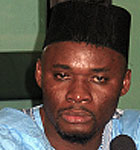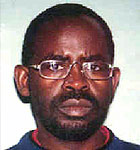Related Research Articles

The International Criminal Tribunal for Rwanda was an international court established in November 1994 by the United Nations Security Council in Resolution 955 in order to adjudicate people charged for the Rwandan genocide and other serious violations of international law in Rwanda, or by Rwandan citizens in nearby states, between 1 January and 31 December 1994. The court eventually convicted 61 individuals and acquitted 14.

Butare was a province (prefecture) of Rwanda prior to its dissolution in January 2006. Butare city was the second largest city in Rwanda and one of the nation's former twelve provinces. It is located in south-central region of the country and borders Burundi to the south. It had a population of 77.449 as of January 2006.

Pauline Nyiramasuhuko is a Rwandan politician who was the Minister for Family Welfare and the Advancement of Women. She was convicted of having incited troops and militia to carry out rape during the Rwandan genocide of 1994. She was tried for genocide and incitement to rape as part of the "Butare Group" at the International Criminal Tribunal for Rwanda (ICTR) in Arusha, Tanzania. In June 2011, she was convicted of seven charges and sentenced to life imprisonment. Nyiramasuhuko is the first woman to be convicted of genocide by the ICTR, and the first woman to be convicted of genocidal rape.
Protais Zigiranyirazo commonly known as Monsieur Zed, is a Rwandan businessman and politician and was governor of the Ruhengeri prefecture in northwestern Rwanda from 1974 to 1989. Zigiranyirazo was a member of the Akazu, an elite circle of relatives and friends of former President Juvénal Habyarimana who pushed the Hutu Power ideology.
Jean Kambanda is a Rwandan former politician who served as the Prime Minister of Rwanda in the caretaker government from the start of the 1994 Rwandan genocide. He is the only head of government to plead guilty to genocide, in the first group of such convictions since the Convention on the Prevention and Punishment of the Crime of Genocide came into effect in 1951.
Jean-Paul Akayesu is a former teacher, school inspector, and Republican Democratic Movement (MDR) politician from Rwanda, convicted of genocide for his role in inciting the 1994 genocide against the Tutsi.
Simon Bikindi was a Rwandan musician and singer who was formerly very popular in Rwanda. His patriotic and nationalist songs were playlist staples on the national radio station Radio Rwanda during the Rwandan Civil War. For his actions during the Rwandan genocide, he was tried and convicted for incitement to genocide by the International Criminal Tribunal for Rwanda (ICTR) in 2008. He died of diabetes at a Beninese hospital in December 2018.

Hassan Ngeze is a Rwandan journalist and convicted war criminal best known for spreading anti-Tutsi propaganda and Hutu superiority through his newspaper, Kangura, which he founded in 1990. Ngeze was a founding member and leadership figure in the Coalition for the Defence of the Republic (CDR), a Rwandan Hutu Power political party that is known for helping to incite the genocide.
Athanase Seromba is a Catholic priest from Rwanda who was found guilty of committing genocide and of crimes against humanity during the Rwandan genocide.
Tharcisse Renzaho is a Rwandan soldier, former politician and war criminal. He is best known for his role in the 1994 genocide against the Tutsi.
Ildephonse Hategekimana is a Rwandan soldier who participated in the Rwandan genocide.
Ildéphonse Nizeyimana is a Rwandan soldier, who was convicted of his participation in the Rwandan genocide by the International Criminal Tribunal for Rwanda.
Casimir Bizimungu is a Rwandan politician.

Jean-Bosco Barayagwiza was a convicted génocidaire and politician associated with the Hutu Power movement. A high-ranking civil servant, Barayagwiza served as policy director within the Ministry of Foreign Affairs at the time of the Rwandan genocide. He has been described as one of the "masterminds" of the genocide.
Ferdinand Nahimana is a Rwandan historian, who was convicted of incitement to genocide for his role in the Rwandan genocide.
Callixte Kalimanzira was the interior minister of the interim government of Rwanda during the 1994 genocide.
Prosper Mugiraneza is a former minister of civil service in Rwanda. Mugiraneza was born in 1957 in Kigarama, Kibungo Province, Rwanda. He is a graduate of the National University of Rwanda in Butare, where he earned a law degree . Before becoming minister of civil service, Mugiraneza was a trial attorney in Byumba prefecture, a chief prosecutor in Gisenyi prefecture, a chief prosecutor in Kigali capital, Secretary General of the Ministry of Justice and minister of labour and social affairs. He is married and has four children. His wife and children currently reside in Europe.
Jean de Dieu Kamuhanda is a Rwandan politician who was sentenced to life imprisonment by the International Criminal Tribunal for Rwanda (ICTR) for his role in the 1994 Rwandan Genocide.
Jean-Baptiste Habyalimana was a Rwandan academic and politician who served as the Prefect of Butare and was killed during the Rwandan genocide in 1994. He was the only Tutsi prefect at the time of the genocide, and also the only prefect belonging to the Liberal Party. He had resisted the genocide.
Joseph Nzirorera was a Rwandan politician and accused génocidaires who was arrested by the International Criminal Tribunal for Rwanda (ICTR) for his role in the Rwandan genocide.
References
- 1 2 "Appeals Chamber Acquits and Releases Justin Mugenzi and Prosper Mugiraneza - United Nations International Criminal Tribunal for Rwanda". Archived from the original on 2018-10-20. Retrieved 2018-12-02.
- 1 2 Agnew, Alison. "Acquittals in Mugenzi & Mugiraneza v. Prosecutor Contribute To the Weak Legacy of the International Criminal Tribunal for Rwanda". Comparative Law Review. 38: 16.
- ↑ Wallis, Andrew. "International justice and Rwanda: Has the UN failed again?". Archived from the original on 2018-08-01. Retrieved 2018-12-02.
- ↑ "Rwanda court's forgotten men pose challenge to international justice". Reuters. 2014-09-28. Archived from the original on December 2, 2018. Retrieved 2018-12-02.